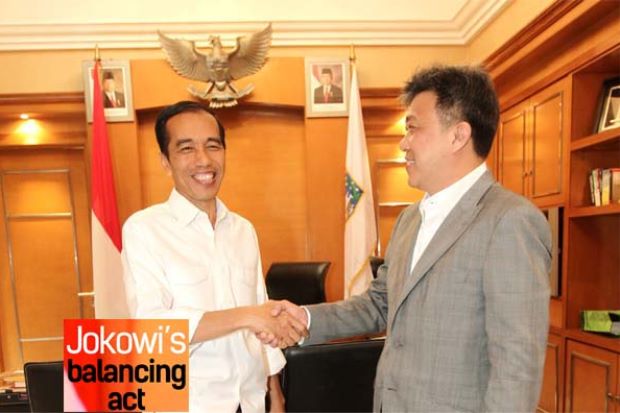
"I am aware that there are domestic political pressures to limit foreign expansion, including in the financial services and plantations sectors. Still, to ensure future rapid economic growth we need massive investments,” Jakowi (left) said in an interview with The Star's Wong Chun Wai (right) – AZMAN GHANI/The Star"
JAKARTA: Indonesian president-elect Joko Widodo has invited Malaysian businessmen to invest in manufacturing, tourism and infrastructure which have been identified as three core areas of growth under his leadership.
He said Indonesia needed massive investment and if domestic capital was not sufficient then Indonesia would need to look for investors abroad including Malaysia.
“It is my task as president to balance out these pressures and my commitment to the Indonesian people is to create economic growth and jobs.
“I am aware that there are domestic political pressures to limit foreign expansion, including in the financial services and plantations sectors. Still, to ensure future rapid economic growth we need massive investments,” he said in an interview with StarBiz.
Popularly known as Jokowi, the president-elect pointed out that construction of Jakarta’s RM4.43bil mass rapid transit system has started after decades of delay. Officials reportedly broke ground on the 15.7km elevated and subterranean railway in November 2013, with completion targeted for 2017.
The project is being built largely by consortiums of Indonesian and Japanese companies, to alleviate gridlock in the heart of a greater metro area of almost 30 million people. It had been in the planning stages for more than 20 years, according to reports.
Hinting that Malaysian businessmen should look beyond oil palm plantations, Jokowi said Indonesia welcomed Malaysian investment in infrastructure.
He said it was his task as the incoming president to balance out these pressures, adding that “my commitment to the Indonesian people is to create economic growth and employment”.
Jokowi was asked to respond to concerns from the business community, including those from Malaysia, that during the presidency election campaign, the candidates had played nationalist cards on the economy.
He was also asked about his government’s priorities including his trade policies, especially on direct investments, equity in financial services and plantations.
“There’s a lot of work that needs to be done. I intend to build on the good foundations of the past administration and shake up our bureaucracy. Our public servants must be prepared to serve the people first.
“We will focus on the issues that matter: getting the economy growing, eliminating corruption and investing in quality education and a universal healthcare system.
“At the same time, more investments and attention will be channelled into infrastructure development. This can be done by utilising the savings from fuel subsidy reductions”.
Jokowi also said Indonesia wanted tourists to see beyond Jakarta and Bali, adding that he wanted greater efforts to promote lesser known areas like Sumba, an island in eastern Indonesia, and Raja Ampat, an archipelago of over 1,500 islands on the island of New Guinea in the country’s west Papua province. He would also like more visitors to come to his hometown of Solo, in central Java, as well as the nearby city of Yogyakarta.
While Jokowi appeared reluctant to provide direct and specific answers to the Indonesian parliament’s decision to limit foreign ownership on plantations to 30%, those close to him took pains to explain the intricacies involved in Indonesian politics, pointing out that Jokowi had yet to be sworn in as president.
On the yearly haze problem which affected Malaysia and Singapore, Jokowi alluded that it could be resolved by stepping up the enforcement of the law, something that he plans to undertake during his tenure.
He said it was not a difficult problem to overcome as long as there was a strong political will to enforce the law.
“It is caused by people and companies. The officials in local and provincial governments know exactly the locations of those areas involved. If enforcement was good, the haze problem could be resolved,” he said.
In this respect, the president-elect vowed tough enforcements and said this message would be communicated to the relevant authorities in the regions.
He said he wanted the local officials including governors and mayors in these locations to explain how they intend to stop slash-and-burn activities when clearing land.
Related stories
President-elect Joko Widodo talks of the new democracy in Indonesia
Jokowi going for moderation





